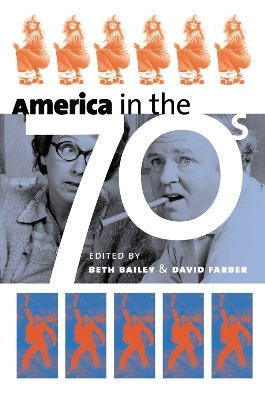
America in the Seventies
Seiten
2004
University Press of Kansas (Verlag)
978-0-7006-1327-4 (ISBN)
University Press of Kansas (Verlag)
978-0-7006-1327-4 (ISBN)
The 70s witnessed economic decline in America, coupled with a series of foreign policy failures, events that created an air of unease and uncertainty. This volume examines the ways in which Americans responded to a changing world and sought to redefine themselves.
Tucked between the activist Sixties and the conservative Eighties lies a largely misunderstood and still under-appreciated decade. Now nine leading scholars of postwar America offer a revealing look at the Seventies and their rightful place in the epic narrative of American history. This is the first major work to relate the economic decline and cultural despair of the Seventies to the creative efforts that would reshape American society. Dogged by economic and political crises at home and foreign policy failures abroad, Americans responded to a growing sense of uncertainty in a variety of ways. Some explored the new freedoms promised by the social change movements of the late Sixties. Some challenged the technological verities that ruled corporate America. Others sought to create autonomous zones in the ruins of decaying cities or on the bleak landscape of anemic suburbia. And, against a backdrop of massive economic dislocation and bicentennial celebrations, many Americans struggled to redefine patriotism and the meaning of the American dream.
Tucked between the activist Sixties and the conservative Eighties lies a largely misunderstood and still under-appreciated decade. Now nine leading scholars of postwar America offer a revealing look at the Seventies and their rightful place in the epic narrative of American history. This is the first major work to relate the economic decline and cultural despair of the Seventies to the creative efforts that would reshape American society. Dogged by economic and political crises at home and foreign policy failures abroad, Americans responded to a growing sense of uncertainty in a variety of ways. Some explored the new freedoms promised by the social change movements of the late Sixties. Some challenged the technological verities that ruled corporate America. Others sought to create autonomous zones in the ruins of decaying cities or on the bleak landscape of anemic suburbia. And, against a backdrop of massive economic dislocation and bicentennial celebrations, many Americans struggled to redefine patriotism and the meaning of the American dream.
Beth Bailey is professor of American studies and Regents Lecturer at the University of New Mexico. Her books include Sex in the Heartland and From Front Porch to Backseat. David Farber is professor of history at the University of New Mexico. His books include The Age of Great Dreams: America in the 1960s and The Sixties: From Memory to History. They are coauthors of The Columbia Guide to America in the 1960s and The First Strange Place.
| Erscheint lt. Verlag | 30.6.2004 |
|---|---|
| Reihe/Serie | CultureAmerica |
| Verlagsort | Kansas |
| Sprache | englisch |
| Maße | 159 x 233 mm |
| Gewicht | 370 g |
| Themenwelt | Geschichte ► Allgemeine Geschichte ► Zeitgeschichte |
| Geisteswissenschaften ► Geschichte ► Regional- / Ländergeschichte | |
| ISBN-10 | 0-7006-1327-7 / 0700613277 |
| ISBN-13 | 978-0-7006-1327-4 / 9780700613274 |
| Zustand | Neuware |
| Haben Sie eine Frage zum Produkt? |
Mehr entdecken
aus dem Bereich
aus dem Bereich
Gewalt, Umwelt, Identität, Methode
Buch | Softcover (2024)
Spector Books OHG (Verlag)
CHF 49,95
wie Freud im Kollektiv verschwand
Buch | Hardcover (2024)
Klett-Cotta (Verlag)
CHF 34,95


